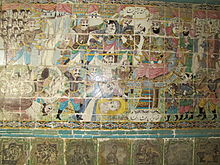
Back Mukhtar al-Thaqafi Afrikaans المختار الثقفي Arabic المختار الثقفى ARZ Muxtar Səqəfi Azerbaijani مختار ثقفی AZB মুখতার আল সাকাফি Bengali/Bangla Al-Mukhtar ibn Abi-Ubayd ath-Thaqafí Catalan Al-Muchtār ibn Abī ʿUbaid German Mujtar al-Thaqafi Spanish مختار ثقفی Persian
Mukhtar al-Thaqafi الْمُخْتَار ٱبْن أَبِي عُبَيْد الثَّقَفِيّ | |
|---|---|
 Tile-work from Kermanshah depicting Mukhtar | |
| Born | Mukhtar ibn Abu Ubayd c. 622 Ta'if (Hejaz, Arabia) |
| Died | 3 April 687 (aged 64–65) Kufa (Iraq) |
| Burial place | Great Mosque of Kufa |
| Other names | Abu ishaq “Father of Isaac” |
| Era | |
| Known for | Leader of an anti-Umayyad revolt in Kufa |
| Title | Yad Allah “Hand of god” |
| Opponents | |
| Criminal charges | Military occupation (680-681) |
| Spouses |
|
| Children | Ishaq |
| Parents |
|
| Relatives | Abd Allah ibn Umar (brother-in-law) |
| Family | Banu Thaqif (tribe) |
| Military career | |
| Allegiance | |
| Battles/wars |
|
Al-Mukhtar ibn Abi Ubayd al-Thaqafi (Arabic: الْمُخْتَار ٱبْن أَبِي عُبَيْد الثَّقَفِيّ, romanized: al-Mukhtār ibn Abī ʿUbayd al-Thaqafī; c. 622 – 3 April 687) was a pro-Alid revolutionary based in Kufa, who led a rebellion against the Umayyad Caliphate in 685 and ruled over most of Iraq for eighteen months during the Second Fitna.
Born in Ta'if, Mukhtar moved to Iraq at a young age and grew up in Kufa. Following the death of Husayn ibn Ali, a grandson of the Islamic prophet Muhammad, at the hands of the Umayyad army in the Battle of Karbala in 680, he allied with the rival caliph Abd Allah ibn al-Zubayr in Mecca, but the alliance was short-lived. Mukhtar returned to Kufa where he declared Muhammad ibn al-Hanafiyya, a son of caliph Ali (r. 656–661) and brother of Husayn, the mahdi and the imam, and called for the establishment of an Alid caliphate and retaliation for Husayn's killing. He took over Kufa in October 685, after expelling its Zubayrid governor, and later ordered the execution of those involved in the killing of Husayn. Hostile relations with Ibn al-Zubayr ultimately led to Mukhtar's death by the forces of the Zubayrid governor of Basra, Mus'ab ibn al-Zubayr, following a four-month siege.
Although Mukhtar was defeated, his movement would have far-reaching consequences. After his death, his followers formed a radical Shia[a] sect, later known as the Kaysanites, who developed several novel doctrines and influenced later Shia ideology. Mukhtar raised the social status of mawali (non-Arab local converts to Islam) and they became an important political entity. The mawali and Kaysanites went on to play a significant role in the Abbasid Revolution sixty years later. Mukhtar was important as an early proponent of treating Arab and non-Arab Muslims on an equal footing. He is a controversial figure among Sunnis; condemned by them as a false prophet, but revered by the Shia because of his support for the Alids. Modern historians' views range from regarding him as a sincere revolutionary to an ambitious opportunist.
- ^ Madelung 1997, pp. 420–424.
Cite error: There are <ref group=lower-alpha> tags or {{efn}} templates on this page, but the references will not show without a {{reflist|group=lower-alpha}} template or {{notelist}} template (see the help page).
© MMXXIII Rich X Search. We shall prevail. All rights reserved. Rich X Search